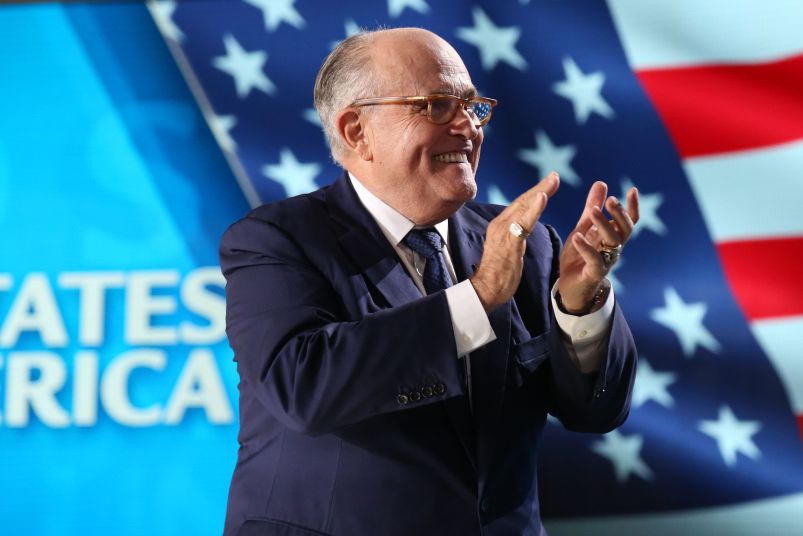It’s one of the stranger subplots in what may turn out to be the defining story of President Trump’s tenure.
Between March and April 2019, U.S. Ambassador to Ukraine Marie Yovanovitch went from having a secure spot as the country’s representative in Kyiv to having nothing at all, fired amid jockeying by Trump attorney Rudy Giuliani to pressure Ukraine into manufacturing dirt as part of the President’s 2020 reelection bid.
“There have been two American foreign policy approaches towards Ukraine- one that was conducted by the embassy and State Department,” former U.S. Ambassador to Ukraine Steven Pifer told TPM. “And a second one led by Rudy Giuliani which has been focused on enhancing the prospects for the presidential election next year.”
“Those two agendas are not the same,” he added.
While it must have been a surreal experience for Yovanovitch, a well-respected career diplomat, for House Democrats, it could be a boon for their burgeoning impeachment inquiry. A deposition with Yovanovitch is scheduled for Oct. 2, as the chamber prepares to consider whether to send a case for Trump’s removal to the Senate.
The earliest traces of a campaign to force Yovanovitch’s removal come in May 2018, when former Rep. Pete Sessions (R-TX) sent a letter to Secretary of State Mike Pompeo informing him that Yovanovitch had an “anti-Trump bias,” while demanding her removal.
The letter does not appear to have had any immediate effect on the diplomat’s posting to Kyiv.
Rather, it would appear that it was Yovanovitch’s decision to criticize then-Ukraine prosecutor general Yuriy Lutsenko that eventually led to her departure.
In a March 5 speech, Yovanovitch hit out at Lutsenko’s tenure and demanded the resignation of another prosecutor over failed efforts at tackling corruption. But within weeks, Lutsenko hit back at Yovanovitch with an accusation of his own conveyed via The Hill‘s John Solomon: that she had previously provided Ukrainian prosecutors with a list of officials not to be prosecuted.
Through March and April, Lutsenko was conferring with Giuliani, and Solomon continued to pump out articles citing Lutsenko as accusing Yovanovitch — and later, the Bidens — of corruption.
Pressure continued to build around The Hill articles, culminating in an April 25 appearance by President Trump on Sean Hannity’s Fox News program in which Trump said that Attorney General Bill Barr “would want to see” Lutsenko’s allegations.
Four days later, Yovanovitch was recalled to Washington, according to the whistleblower complaint released by the House Intelligence Committee.
The State Department put out a statement on May 6, saying that Yovanovitch would conclude her posting to Kyiv “as planned.”
The intelligence community whistleblower wrote that Yovanovitch’s “tour was curtailed because of pressure stemming from Mr. Lutsenko’s allegations.”
Pifer, the former U.S. Ambassador to Ukraine, described the State Department’s statement on Yovanovitch’s departure from Kyiv as “total bullshit.”
“Her removal was unusual,” Pifer said. “Typically, when you have a new president taking office in a host country, you would like to have an ambassador there to make initial contacts with the president and his team.”
Within one week of Yovanovitch’s removal, Lutsenko began to walk back his statements, telling Bloomberg that there was “no evidence” of wrongdoing by the Bidens.
Pifer told TPM that the problem for the Ukrainian government is that Giuliani “is probably closer to the President than any other American you’d be able to talk to.”
“I’m worried that you had some in Ukraine thinking we should respond to Giuliani’s agenda,” he added.
The House Intelligence Committee is investigating Giuliani’s activities — and Yovanovitch’s firing— with the House Oversight and Foreign Affairs committees. A subpoena issued by the committees to Giuliani on Monday demanded documents relating to Yovanovitch’s firing.
But they’re in uncharted territory.
Philip Zelikow, a history professor at the University of Virginia, told TPM, “As for the Giuliani mission to Ukraine, I know of no precedent in U.S. history for that sort of mission to a foreign government.”
He added that “it is hard to evaluate what happened to Ambassador Yovanovitch until more information is made available.”







I hope Ambassador Yovanovitch’s deposition is released quickly! The evisceration of the State Department is deeply disturbing and I am sure she’ll be able to train a bright light on it.
And if she wants to settle some scores, that will be fun.
What the hell was that last comment?
This article is helpful.
*" . . . the Ukrainian government wanted her to ease up on pressing for investigations into corruption—and expected her to do so because they perceived Trump would care less about the issue— that they began a campaign against her . . . That campaign gained steam with the arrival on the scene of Trump’s personal lawyer Rudy Giuliani"
Ukraine is not where I expected the first major blow to hit Team Trump, but it’s looking to be a fatal one as it’s turning out to be a lot bigger and worse than it first looked like. Watergate was like that too, out of left field and unexpected, and initially seeming like a minor matter. Perhaps that’s how it always is.
To paraphrase Lennon, shit’s what happens when you’re busy making other plans.
Pretty sure that’s gonna be the entire Wikipedia entry, for future generations, under “Trump Presidency”.